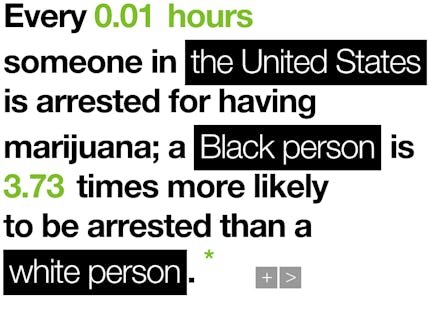This Perfectly Sums Up How Racist America's War on Drugs Has Been

Popular backlash against marijuana criminalization just got a new weapon.
On Tuesday, the American Civil Liberties Union launched The Uncovery, an interactive website that documents the myriad injustices linked to marijuana arrests and convictions. With special focus on the law's racial disparities, the site allows users to take statistics and share them with friends or legislators as engaging customizable graphics. The whole process takes 60 seconds or less.
The site draws its facts from the ACLU's "War on Marijuana" report, which incorporates video, graphics, arrest rate statistics and opportunities for citizens to "take action." A press release characterizes The Uncovery as a "simple, elegant advocacy tool" for marijuana legislation reform.
Its first image is this national statistic, which can be customized via drop-down menus to reflect how it breaks down by state:
State sample:
And:
Image Credit: The Uncovery
The "Act" page features options to share a given statistic on social media or with your elected official. A 20-point fact sheet also provides illuminating statistics, like how money much states spend incarcerating people for marijuana possession (Answer: $496 million in 2010 alone).
Links to the original "War on Marijuana" report yield more helpful graphics:
Image Credit: ACLU
The background: The lunacy of marijuana criminalization has received increased attention lately, as states like Colorado and Washington became the first to legalize the plant's recreational use. In 2012, police made a marijuana arrest every 42 seconds, an enforcement rate that costs the U.S. billions annually:
Since 1970, the government has spent $1.5 trillion on "drug control," though addiction rates remaining constant:
The racial factor in marijuana arrests is equally sobering, with blacks in particular being disproportionately arrested and jailed for marijuana offenses:
Image Credit: The Washington Post
Some experts have even floated the idea of drug war reparations, using government policy's disproportionate targeting of minority communities to frame it as a racial war. Michelle Alexander, author of The New Jim Crow: Mass Incarceration in the Age of Colorblindness, has been especially vocal on the topic: "I think we have to be willing, as we're talking about legalization, to also start talking about reparations for the war on drugs, how to repair the harm caused," she said earlier this month. "In many ways, the imagery doesn't sit right. Here are white men poised to run big marijuana businesses, dreaming of cashing in big — big money, big businesses selling weed — after 40 years of impoverished black kids getting prison time for selling weed, and their families and futures destroyed."
A brighter future: Meanwhile, public opinion has never been more in favor of decriminalization. In 2013 52% of Americans thought marijuana should be legalized, with 45% opposed according to Pew. Budget estimates suggest legal marijuana sales will generate $190 million in tax revenue for Colorado between 2015-2019. Nationwide legalization would yield an estimated "cash crop" potential of $100 billion annually. Sales could generate as much as $120 million.
With Washington, D.C. decriminalizing marijuana possession in small amounts, and numerous states seriously considering legalization, it's safe to say a new "green revolution" is officially upon us. But let us not forget that the movement is also inextricably linked to a decades-long travesty of racial injustice, as the ACLU points out.
Hopefully their Uncovery tool will empower citizens to push the fight even closer to victory.